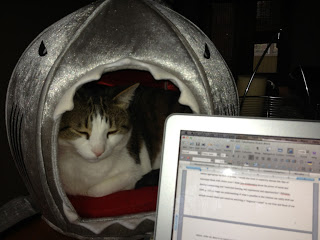Fear is the anticipation of loss.
--Tara Brach
Perhaps you see the above quote and think, "Duh. Tell me something I don't already know!" Or perhaps you see those six words as a gateway to unraveling a lifetime of fleeing, fighting, and freezing. The latter was my experience.
Fear threads through so much in U.S. society. Right now, for example, our public eye seems attuned to the triple threat of a war with Syria, yet another mass shooting, and Miley Cyrus's VMA performance. I am curious what happens when we frame these events as haunting reminders of loss and ask the question, What am I afraid of losing if we attack another country? I watch the news? I read another scathing critique?
Another way into this idea that fear foreshadows loss is to consider the question: What would I have to face if I stopped running from (as well as chasing or numbing to) fear? If most of us pause--really pause--and explore this question with openness and curiosity, I am confident we will come up against various kinds of loss. Loss of job security or the job itself. Loss of a sense of control over our loved ones and/or ourselves. Loss of the story we have long told ourselves about how our lives are supposed to go. Loss of our health. Loss of a friend, family member, or relationship. Loss of our own lives. Just to name a few.
Fine. I fear loss. So what? The major issue at hand is how fear can shut us down so that we walk through the world as a shell of ourselves, missing out on the joy, peace, and wonder that accompany fear and loss. Although fear is a natural reaction to threat, the amazing human mind can use our thoughts to make fear a monster in a never-ending horror show.
When considering the extent of fear's power to suppress our happiness, creativity, and spontaneity, I find Jaak Panksepp's studies of rat pups particularly compelling. As he wrote,
In this experiment, young rats were first allowed five-minute play periods on four successive days, and then on the fifth, half were exposed to a small tuft of cat hair on the floor of their 'playroom.' During that session, play was completely inhibited. The animals moved furtively, cautiously sniffing the fur and other parts of their environment. They seemed to sense that something was seriously amiss...following a single exposure to cat odor, animals continued to exhibit inhibition of play for up to five successive days.
A small tuft of cat hair extinguished previously vigorous play even though the cat was nowhere to be seen. How many of us go through our days hidden and afraid in anticipation of a bogeyman that does not actually exist? And, again, what are we afraid of losing?
In my own life, I've recently come up against fear as the anticipation of loss in the realm of a beloved pet's illness. Like many people in the U.S., I rely on my domesticated creatures for comfort and simple love. I used to judge myself for doting on my two cats, but I think our material and emotional devotion to our pets in this country is a sociocultural phenomenon related to our growing sense of social disconnection and simultaneous craving for a connection with living organisms outside ourselves. Like Donna Haraway, I agree that we can learn from this inter-species encounter. As she wrote, "Today, I think we have an obligation to learn from dogs. I think that we can become better human beings by paying attention to the relationships we're in with dogs. Together we can not only survive, but flourish. We can learn to be present and to be real."
I'm going to apply her argument to my 9-year-old cat, Chopper, who has taught me to be more "present and real" in recent months on account of his struggle with cancer.
As I have deliberated what treatments to pursue and the likelihood that he will come out of this thing cancer-free, I have come up against an intense fear of his eminent death. I have wanted all of this to just go away and, at times, avoided Choppypants, as we lovingly call him, because the fear and sadness feel overwhelming. Yet Chopper keeps showing up (he currently is insisting on being in my lap), practically yelling at me to remember, "I'm here right now! Play with me and stop dwelling on all the bad stuff that might happen, down the road, in some story you're calling 'The Future.'" He is teaching me to stay with my fears and sadness--to allow them so they have the space to do their thing and then go on their merry way. After all, emotions have a biochemical lifetime of 90 seconds when we do not use our thoughts to create a lifetime movie.*
Chopper is also reminding me, "Love is what we were born with. Fear is what we learned here."** In unlearning my old relationship with fear, I am finding I can return to the love that was always here and is available in the furry mass on my lap right now.

